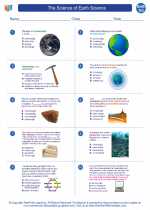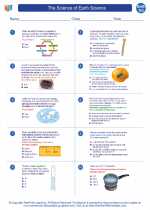The Science of Earth Science
Earth science is the study of the Earth and its processes. It encompasses a wide range of topics including geology, meteorology, oceanography, and astronomy. Understanding the science of Earth science involves learning about the interconnected systems that shape our planet and impact the environment.
Key Concepts in Earth Science
- Geology: The study of the Earth’s composition, structure, and history, including the formation of rocks, minerals, and geological processes such as plate tectonics.
- Meteorology: The study of the Earth’s atmosphere, weather patterns, and climate. This includes topics such as air pressure, precipitation, and the causes of weather phenomena.
- Oceanography: The study of the Earth’s oceans, including their physical and biological properties, ocean currents, marine life, and the impact of human activities on marine ecosystems.
- Astronomy: The study of celestial objects such as stars, planets, and galaxies, as well as the phenomena that occur in space, including the expansion of the universe and the formation of celestial bodies.
Understanding Earth Systems
Earth science also involves understanding the interconnected systems that shape the Earth, including the rock cycle, water cycle, and the impact of human activities on the environment. The study of Earth science helps us better understand natural phenomena such as earthquakes, volcanic eruptions, and weather patterns, as well as human impacts such as climate change and pollution.
Studying Earth Science
To excel in the study of Earth science, it is important to develop a strong foundation in scientific principles, critical thinking, and observation skills. Additionally, hands-on laboratory experiences and fieldwork can provide valuable insights into the Earth’s processes and phenomena.
Key Topics to Focus On
- The structure and composition of the Earth’s layers
- The causes and effects of natural phenomena such as earthquakes and volcanoes
- The factors influencing weather and climate patterns
- The impact of human activities on the environment
- The role of technological advancements in advancing our understanding of Earth science
By mastering these key concepts and topics, students can gain a deeper appreciation for the science of Earth science and its relevance to our planet and society.
.◂Earth Science Worksheets and Study Guides High School. The Science of Earth Science

 Worksheet/Answer key
Worksheet/Answer key
 Worksheet/Answer key
Worksheet/Answer key
